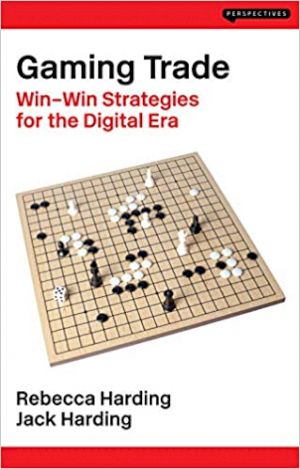24 April 2020
Gaming Trade:
Win‑Win Strategies for the Digital Era
Rebecca Harding and Jack Harding
2019, London Publishing Partnership, 208 pages,
ISBN 9781913019006
Reviewer: Ian Bright

Winning a trade war is easy. This statement, attributed to US President Donald Trump, is arguably correct if one takes a misguided, mercantalist view. But for many policy makers, international trade has never been mainly about trade and current account balances. It has always been intertwined with foreign and military affairs. This has been accentuated since Trump took office in January 2017. Rebecca Harding and Jack Harding make this clear in their latest book Gaming trade: Win-Win Strategies for the Digital Era writing, “Trade is now an explicit alternative to direct military engagement. What has been implicit in the past is now overt”. The authors cite Larry Kudlow, Director of the US National Economic Council, saying in an address to the Export-Import Bank of the United States, “You are a financial tool and a national security weapon.” (p. xiv)
This argument is not new. It was foreshadowed by the same authors in their 2017 book “The Weaponization of Trade: The Great Unbalancing of Politics and Economics”. Their latest book extends that analysis to explicitly incorporate how advances in technology are changing trade disputes.
The battle for power
When thinking about today’s trade disputes, especially between the US and China, these must be considered in the wider context of gaining control of key markets. The authors argue, “The conflict is not about trade, or even technology or military power. Instead, it is about controlling the new techno-economic paradigm that we have seen emerging since the financial crisis.” (p9).
The techno-economic paradigm refers to the way that technology has become a vital part of the global economy. The authors write “In the digital space, China is powerful. Its technology has built a rival system to that of the United States which can help with accessing the 5G networks, improve the functionality of our smartphones and allow us to set the kettle so that it boils just as we get home from work. Alipay rivals Apple Pay across Asia; Alibaba rivals Google.” (p8) The authors’ observation has been highlighted by the dispute between the US and the UK at the start of this year about the UK’s use of equipment from Huawei in 5G networks and its possible effect on co-operation under the Five Eyes security alliance.
Gaining control of technology requires having a dominant position in digital markets. This means playing a different game than merely reducing a trade deficit. Digital markets concentrate knowledge and influence in a few companies at key nodes in a network. Being dominant in those companies and nodes is key.
The rules have changed
Domination differs from co-operation. Yet much of trade arrangements set up after the second world war under the GATT and the WTO (and especially during the post-cold war era) depend upon co-operation. These arrangements allowed China to integrate itself into the world economy and challenge the US. The US is no longer willing to accept this and is changing the rules of international trade. For example, it is willing to see the WTO weakened by not replacing appellate judges at the WTO who act in a dispute resolution capacity (p.80). The US is seeking to preserve its power. The Economist magazine accentuated the importance of this development in a November 2019 article titled “It’s the end of the World Trade Organisation as we know it.”
Gaining dominant positions in markets takes time. China is willing to wait and slowly build influence across many countries by establishing mechanisms that rival those that already exist. China’s Belt and Road Initiative (BRI) is an example of this. Technological and financial commitments accompany the BRI. It slowly builds China’s influence and power in different countries as an alternative to US-based alternatives.
Russia and Europe have less powerful positions in global digital markets. But both are important in regional terms. Russia is willing to use military force and trade in energy (witness the Ukraine) as weapons. Similarly, Saudi Arabia has showed this year that it is willing to increase oil production and lower the oil price to achieve political and commercial ends. Europe is a global regulatory super power built on co-operation between numerous states. But co-operation is not a key element in trade at the moment.
Applying game theory
The authors do not shy away from the dangers that can arise from current conflicts. Trade wars have led to real wars in the past. The solution to increasing trade tensions is to apply game theory. Rising tensions between the US and China will harm both countries and the global economy. Compromise is the best solution that can be hoped for. Reforming the global trade negotiation bodies that are being weakened will be necessary. Whether that will happen before tensions trip into something more serious cannot be guaranteed.
